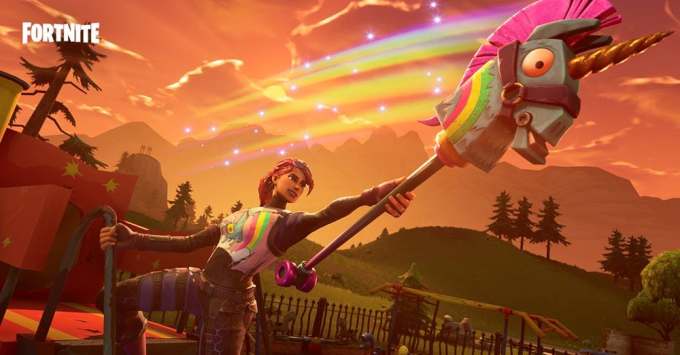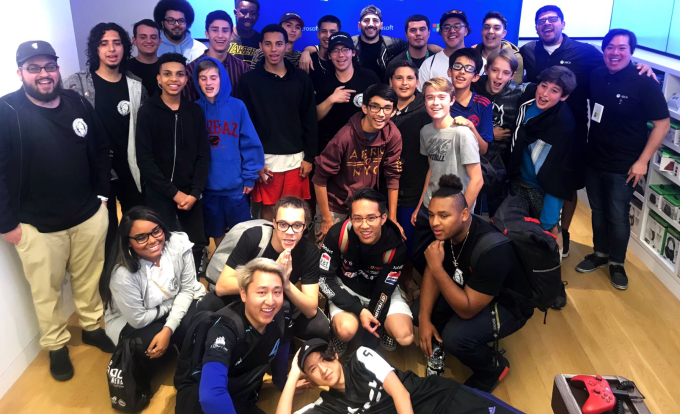My parents are approaching 60. When they were young, they hung out at diners, or drove around in their cars. My generation hung out in the parking lot after school, or at the mall. My colleague John Biggs often talks of hanging out with his nerd buddies in his basement, playing games and making crank calls.
Today, young people are hanging out on a virtual island plagued by an ever-closing fatal storm. It’s called Fortnite.
https://twitter.com/anoopr/status/1071921200937488384
The thread above describes exactly what I’m talking about. Yes, people most certainly log on and play the game. Some play it very seriously. But many, especially young folks, hop on to Fortnite to socialize.
The phenomenon of “hanging out” on a game is not new.
https://twitter.com/panzer/status/1077262656686288896
Almost any popular game results in a community of players who connect not only through the common interest of the game itself, but as real friends who discuss their lives, thoughts, dreams, etc. But something else is afoot on Fortnite that may be far more effectual.
Gaming culture has long had a reputation for being highly toxic. To be clear, there is a difference between talking about someone’s skills in the game and making a personal attack:
“You are bad at this game.” = Fine by me
“You should kill yourself.” = Not fine at all
But many streamers and pro gamers make offensive jokes, talk shit about each other and rage when they lose. It’s not shocking, then, that the broader gaming community that tries to emulate them, especially the young men growing up in a world where e-sports are real, tend to do many of the same things.
A new type of community
But Fortnite doesn’t have the same type of community. Sure, as with any game, there are bad apples. But on the whole, there isn’t the same toxicity permeating every single part of the game.
For what it’s worth, I’ve played hundreds of hours of both Fortnite and Call of Duty over the past few years. The difference between the way I’m treated on Fortnite and Call of Duty, particularly once my game-matched teammates discover I’m a woman, is truly staggering. I’ve actually been legitimately scared by my interactions with people on Call of Duty. I’ve met some of my closest friends on Fortnite.
One such relationship is with a young man named Luke, who is set to graduate from college this spring.
During the course of our now year-long friendship, Luke revealed to me that he is gay and was having trouble coming out to his parents and peers at school. As an older gay, I tried to provide him with as much guidance and advice as possible. Being there for him, answering his phone calls when he was struggling and reminding him that he’s a unique, strong individual, has perhaps been one of the most rewarding parts of my life this past year.
I’ve also made friends with young men who, once they realize that I’m older and a woman and have a perspective that they might not, casually ask me for advice. They’ve asked me why the girl they like doesn’t seem to like them back — “don’t try to make her jealous, just treat her with kindness,” I advised, and then added “OK, make her a little jealous” — or vented to me about how their parents “are idiots” — “they don’t understand you, and you don’t understand them, but they’re doing their best for you and no one loves you like they do” — or expressed insecurity about who they are — “you’re great at Fortnite, why wouldn’t you be great at a bunch of other things?” and “have more confidence in yourself.”
(Though paraphrased, these are real conversations I’ve had with random players on Fortnite.)
There is perhaps no other setting where I might meet these young people, nor one where they might meet me. And even if we did meet, out in the real world, would we open up and discuss our lives? No. But we have this place in common, and as we multitask playing the game and having a conversation, suddenly our little hearts open up to one another in the safety of the island.
But that’s just me. I see this mentorship all the time in Fortnite, in both small and big ways.
Gaming culture is often seen as a vile thing, and there are a wide array of examples to support that conclusion. Though this perception is slowly changing, and not always fair, gamers are usually either perceived as lonely people bathed in the blue glow of the monitor light, or toxic brats who cuss, and throw out slurs, and degrade women.
So why is Fortnite any different from other games? Why does it seem to foster a community that, at the very least, doesn’t actively hate on one another?
One map, a million colors
First, it’s the game itself. Even though Fortnite includes weapons, it’s not a “violent” game. There is no blood or gore. When someone is eliminated, their character simply evaporates into a pile of brightly colored loot. The game feels whimsical and cartoonish and fun, full of dances and fun outfits. This musical, colorful world most certainly affects the mood of its players.

Logging on to Fortnite feels good, like hearing the opening music to the Harry Potter movies. Logging on to a game like, say, Call of Duty: WWII feels sad and scary, like watching the opening sequence to Saving Private Ryan.
Moreover, Fortnite Battle Royale takes place on a single large map. That map may change and evolve from time to time, but it’s even more “common ground” between players. Veterans of the game show noobs new spots to find loot or ways to get around. As my colleague Greg Kumparak said to me, “Every time you go in, you’re going to the same place. Maybe it’s skinned a little different or there’s suddenly a viking ship, but it’s home.”
Of course, there are other colorful, bubbly games that still have a huge toxicity problem. Overwatch is a great example. So what’s the difference?
Managing expectations
Battle Royale has introduced a brand new dynamic to the world of gaming. Instead of facing off in a one-versus-one or a five-versus-five scenario as with Starcraft or Overwatch respectively, Battle Royale is either 1 versus 99, 2 versus 98 or 4 versus 96.
“It isn’t as binary as winning or losing,” said Rod “Slasher” Breslau, longtime gaming and e-sports journalist formerly of ESPN and CBS Interactive’s GameSpot. “You could place fifth and still feel satisfied about how you played.”
Breslau played Overwatch at the highest levels for a few seasons and said that it was the most frustrating game he’s ever played in 20 years of gaming. It may be colorful and bubbly, but it is built in a way that gives an individual player a very limited ability to sway the outcome of the game.
“You have all the normal problems of playing in a team, relying on your teammates to play their best and communicate and to simply have the skill to compete, but multiply that because of the way the game works,” said Breslau. “It’s very reliant on heroes, the meta is pretty stale because it’s a relatively new game, and the meta has been figured out.”
All that, combined with the fact that success in Overwatch is based on teamwork, make it easy to get frustrated and unleash on teammates.
With Fortnite, a number of factors relieve that stress. In an ideal scenario, you match up with three other players in a Squads match and they are all cooperative. Everyone lands together, they share shield potions and weapons, communicate about nearby enemies and literally pick each other up when one gets knocked down. This type of teamwork, even among randos, fosters kindness.
In a worst-case scenario, you are matched up with players who aren’t cooperative, who use toxic language, who steal your loot or simply run off and die, leaving you alone to fight off teams of four. Even in the latter scenario, there are ways to play more cautiously — play passive and hide, or third-party fights that are underway and pick players off, or lure teams intro trapped up houses.
Sure, it’s helpful to have skilled, communicative teammates, but being matched with not-so-great teammates doesn’t send most people into a blind rage.
And because the odds are against you — 1 versus 99 in Solos or 4 versus 96 in Squads — the high of winning is nearly euphoric.
“The lows are the problem,” says Breslau. “Winning a close game of Overwatch, when the team is working together and communicating, feels great. But when you’re depending on your team to win, the lows are so low. The lows aren’t like that in Fortnite.”
The more the merrier
The popularity of Fortnite as a cultural phenomenon, not just a game, means that plenty of non-gamers have found their way onto the island. Young people, a brand new generation of gamers, are obsessed with the game. But folks who might have fallen away from gaming as they got older are still downloading it on their phone, or installing it on the Nintendo Switch, and giving Battle Royale a try. Outsiders, who haven’t been steeped in the all-too-common hatred found in the usual gaming community, are bringing a sense of perspective to Fortnite. There is simply more diversity that comes with a larger pool of players, and diversity fosters understanding.
Plus, Fortnite has solid age distribution among players. The majority (63 percent) of players on Fortnite are between the ages of 18 and 24, according to Verto Analytics. Twenty-three percent of players are ages 24 to 35, and thirteen percent are 35 to 44 years old. However, this data doesn’t take into account players under the age of 18, which represent 28 percent of overall gamers, according to Verto. One way Fortnite is like other games is that 70 percent of players are male.
There aren’t many scenarios where four people, from different backgrounds and age groups, join up under a common goal in the type of mood-lifting setting that Fortnite provides. More often than not, the youngest little guy tries to make some sort of offensive joke to find his social place in the group. But surprisingly, for a shoot and loot game played by a lot of people, that’s rarely tolerated by the older members of a Fortnite squad.
All eyes on Fortnite
The popularity of the game also means that more eyes are on Fortnite than any other game. Super-popular streamer Ninja’s live stream with Drake had more than 600,000 concurrent viewers, setting a record. The more people watching, the more streamers are forced to watch their behavior.
Fortnite streamers are setting a new example for gamers everywhere.
One such streamer is Nick “NickMercs” Kolcheff. Nick has been streaming Fortnite since it first came out and has a huge community of mostly male viewers. I consider myself a part of, albeit a minority in, that community — I’ve subscribed to his channel and cheered for him with bits and participated in the chat. In short, I’ve spent plenty of time watching Nick and have seen him offer a place of support and friendship for his viewers.

I’ve seen Nick’s audience ask him, in so many words, how to lose weight (Nick’s a big fitness guy), or share that they’re dealing with an illness in the family, or share that they’re heartbroken because their girlfriend cheated on them.
In large part, Nick says he learned how to be a mentor from his own dad.
“I remember being in those kinds of positions, but I have a great father that always sat me down and let me vent and then shared his opinion, and reminded me that it isn’t supposed to be easy,” said Kolcheff. “It feels good to bounce things off other people and hard things always feel much easier when you know you’re not alone, and I can relate to my chat the way my dad relates to me.”
Nick always has something positive to say. He reminds his audience that even if they feel alone IRL, they have a community right there in his Twitch channel to talk to. He sets an example in the way he talks about his girlfriend Emu, and the way he treats her on screen. When Nick loses a game and his chat explodes with anger, he reminds them to be cool and to not talk shit about other players.
And it’s easy to see his example followed in the chat, where young people are treating each other with respect and answering each other’s questions.
Nick wasn’t always like this. In fact, the first time that NickMercs and Ninja played together on stream, they brought up the time that Nick challenged Ninja to a fight at a LAN tournament years ago. But both Nick and Ninja have matured into something that you rarely find in online gaming: a role model — and it’s had an effect.
Tyler “Ninja” Blevins, far and away the most successful Twitch streamer ever, decided to stop swearing and using degrading language as his influence in the community and his viewership grew. When his audience said they missed the old Ninja, he had this to say:
I’m the same person, you guys. 2018 can’t handle old Ninja and… guess what, I can’t handle old Ninja because the words that I used to say and the gaming terms I used to say… they weren’t ok, alright? I’ve matured.
Jack “Courage” Dunlop is another Fortnite streamer who uses his influence in the community to mentor young people. He has befriended a young fellow named Connor. Courage helped Connor get his first win and has since continued playing with him and talking to him.
Not only is he being kind to Connor, but he’s setting an example for his viewers.
“In comparison to games like Call of Duty and Gears of War and Halo, the top content creators like Ninja, Sypher PK, Timthetatman, are a little older now,” said Kolcheff. “They’ve come from other games where they already had a following. If you look at me five or six years ago, or any of us, we’ve all chilled out. We were more combative and crazy and had a lot more words to say, but I think we just grew up, and it bleeds through to the community.”
These guys are the exception in the wider world of gaming and streaming. But they represent the future of gaming in general. As e-sports explode with growth, pro players will undoubtedly be held to the same behavioral standards as pro players in traditional sports. That’s not to say that pro athletes are angels, and that’s not to say that bad actors won’t have a following. Just look at PewDiePie.
A matter of time
The e-sports world is realizing that they can’t let their professionals run their mouth without consequences. As the industry grows, highly dependent on advertisers and brand endorsements, with a young audience hanging on every word, it will become increasingly important for leagues, e-sports organizations and game makers to start paying closer attention to the behavior of their top players.
We’re already seeing this type of policing happening on Overwatch, both for pro players and amateurs alike.
There is plenty more work to do. But the problem of removing toxicity from any platform is incredibly difficult. Just ask Facebook and Twitter. Still, it’s only a matter of time before e-sports decision-makers raise the stakes on what they’ll allow from their representatives, which are pro players and streamers.
Toxic behavior is being rejected in most polite society anywhere (except Twitter, because Twitter), and it surely can’t be tolerated much longer in the gaming world. But Fortnite maker Epic Games hasn’t had to put too much effort forth to steer clear of toxic behavior. The community seems to be doing a pretty good job holding itself accountable.
Winning where it counts
Believe you me, Fortnite is not some magical place filled with unicorns and rainbows. There are still players on the game who behave badly, cheat, use toxic language and are downright mean. But compared to other shooters, Fortnite is a breath of fresh air.
No one thing makes Fortnite less toxic. A beautiful, mood-lifting game can’t make much of a difference on its own. A huge, relatively diverse player base certainly makes a dent. And yes, the game limits frustration by simply managing expectations. But with leaders that have prioritized their position as role models, and all the other factors above working in harmony, Fortnite is not only the most popular game in the world, but perhaps one of the most polite.
We reached out to Epic Games, Courage and Ninja for this story, but didn’t hear back at the time of publication.





























Comment